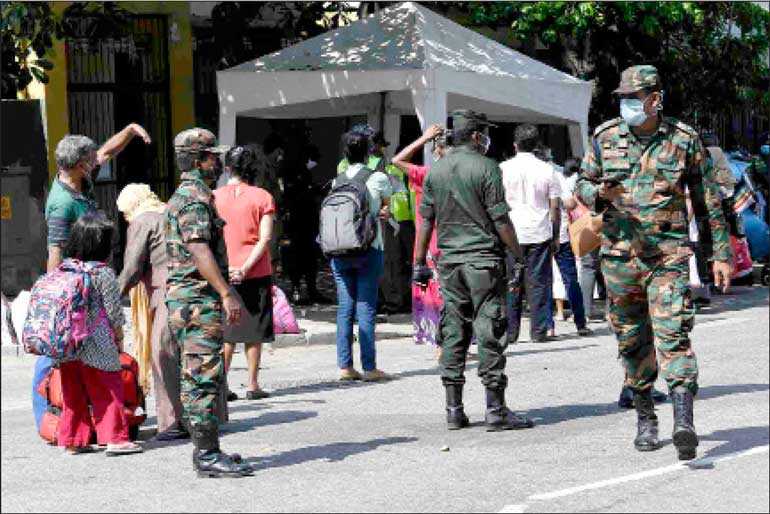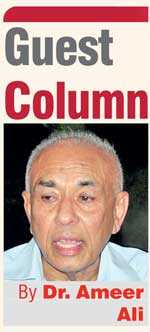Monday Feb 16, 2026
Monday Feb 16, 2026
Friday, 1 May 2020 00:00 - - {{hitsCtrl.values.hits}}

The extent of damage that COVID-19 has caused to people’s health and the economy globally is anyone’s guess, because the damage is continuing to mount. Already, more than three million people  have been confirmed infected, and more than 217,000 had died. Those numbers are increasing, may be at a decreasing rate and in some countries the curve is flattening.
have been confirmed infected, and more than 217,000 had died. Those numbers are increasing, may be at a decreasing rate and in some countries the curve is flattening.
In the meantime, the WHO Chief warns that the worst is yet to come and a second wave cannot be discounted unless a vaccine is discovered soon. Economically, the world has received a severe haemorrhage, and the IMF Chief expects global economic growth to turn sharply southwards this year, and the downturn would be even worse than the 1930 Great Depression. It is in this globally gloomy background that Sri Lankan leaders seem to play politics with COVID-19.
After decades of misgovernment, corruption and economic mismanagement people were totally disillusioned of politicians and were desperate for a team of honest men and women under a strong leader who would take control, cleanse the mess, introduce reforms and lead the country along a path of recovery without depriving the people of their liberty and freedom.
Ruchir Sharma, in his fascinating insights into ‘The Rise and Fall of Nations’ (Penguin, 2017), reckons with justification that, “the probability of successful, sustained reform is higher under fresh leaders rather than stale leaders, under leaders with a mass base rather than well-credentialed technocrats, and under democratic leaders rather than autocrats” (p. 63).
Accordingly, the choice of Gotabaya Rajapaksa (GR) as President, with an outright majority, satisfies Sharma’s “fresh” and “mass based” criteria for a leader, but GR’s own choice of a cabinet from “stale” leaders and his step by step approach so far towards autocracy has jeopardised not only successful and sustained reforms, but also as a result, the economy and democracy.
With the invasion of COVID-19, the country is facing a triple jeopardy. Firstly, in spite of curfews and lockdowns the number infected the virus is increasing and health experts are warning that the country is still not out of danger. This is in contrast to the sanitised picture painted by the government and its apparatchik media channels and spokespersons.
Truth is always the first casualty in a war and it is so in this war against the pandemic too. Inadequate testing, substandard hospital facilities and insufficiently trained paramedics to handle epidemic victims have put people’s lives and livelihoods in danger.
Curfews and lockdowns may be necessary, but soldiers in military kit and their style of commanding and communicating with ordinary people create more anxiety and fear among them than willingness to cooperate and may be one of the reasons why many are not coming forward to report known cases of infection. Popular dissatisfaction appears to increase.
Realising this, GR and his apparatchiks are sanitising the real health scene and politicising it so that a General Election may be held before the situation worsens on both health and economic fronts. This explains the President’s controversy with the Election Commission and infighting within the commission itself.
The election has now been fixed for 20 June, which again may be postponed if the pandemic continues to prevail. However, the Commissioner maintains that there must be a period of six weeks before the date of the election so that a level playing field could be provided for all parties and candidates to canvass for votes. GR on the other hand insists with some justification that the country cannot afford long-running campaign expenses. Does he want to block the Opposition from campaigning at all?
If case the election is postponed to a later date, he is constitutionally obliged either to reconvene the dissolved Parliament or rescind his election gazette notification. He is not willing to do either. As Emeritus Professor Savitri Goonasekera has clearly argued the ball is GR’s court.
The Opposition’s willingness to offer conditional support to GR’s efforts in tackling the pandemic and the economy if the Parliament is reconvened has fallen on deaf ears. It is to avoid the Parliament at all cost that he met the prelates to get their approval and blessing to continue with presidential rule. Sending the Army to Parliament and cancelling all leave of the tri-forces does not augur well for the future of democracy in the country. A fully-fledged autocratic regime if not total dictatorship seems to be rising on the horizon. It is the country’s democracy that is facing the second jeopardy.
Even then, the biggest battle for GR will be in the economic front, which is the third jeopardy. Having committed to an open economy, and relegated import substitution as expensive and wasteful even for food production, the economy is caught in a situation where it is going to face shortages on several fronts.
International trade has been crippled and the country’s exports have to wait its trading partners start regaining growth momentum, which in all probability will take fairly long time. Alternatively, even to provide stimulus for inward looking growth, the Government’s revenue difficulties is proving to be the greatest obstacle.
The latest Central Bank Report, which urges Government to concentrate on revenue mobilisation does not explain how would that be achieved given the falling rate of corporate profit, shrinking markets for exports, declining personal incomes and rising unemployment. Poverty and inequality are set to become nastier, and the country needs a carefully balanced strategy of maintaining a tolerable level of welfare while stimulating productivity and growth. Fiscal consolidation and monetary easing alone are not sufficient.
Even though the economy was already in a perilous state before the outbreak of COVID-19, since the outbreak the situation has become exceptionally dire. Financing growth through further borrowing from external sources is going to be costly, because even the usual lenders are running dry of surplus funds. The latest move for a currency swap with India for $400 million, which is an expensive and risky mode of borrowing, shows how desperate the situation Government is facing.
Given this gloomy scenario, the country needs a collective effort to get through its difficulties. By rejecting the olive branch from the Opposition and by arrogantly pursuing his self-centred strategy of governing through task forces and tri-forces, GR is jeopardising people’s health, democracy and the economy.
(The writer is attached to the School of Business and Governance, Murdoch University, Western Australia.)